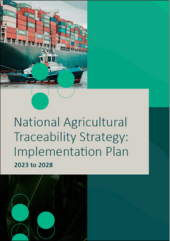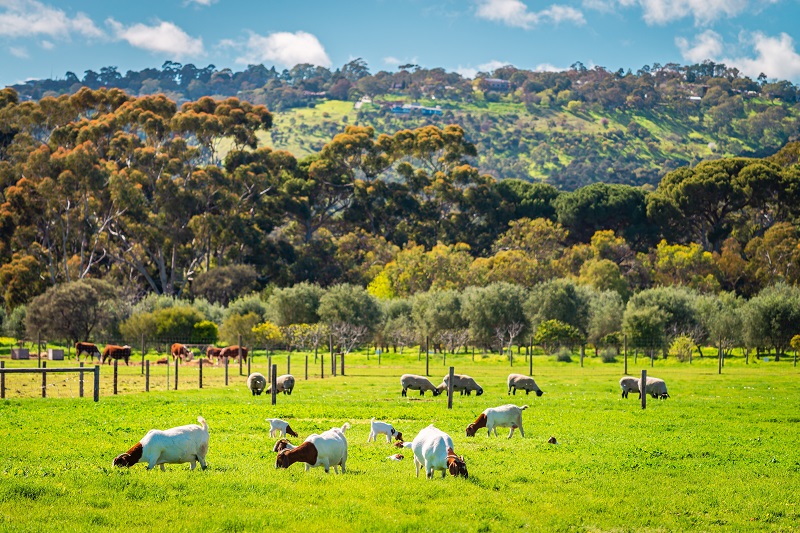Experience the Australian agricultural traceability digital story. The story brings to life the department’s collaborative efforts with industry and across government to secure the future of Australia’s world-class agricultural traceability systems through engaging images, videos and infographics.
The Australian Government is investing over $100 million into Australia’s agricultural traceability systems. This investment builds upon the already strong traceability frameworks in place, especially around food safety, provenance and biosecurity.
Working with industry, states and territories and other supply chain stakeholders, the department supports the development of a coordinated, national approach to enhance traceability in agricultural supply chains.
Traceability is the ability to follow the movement of a product through stages of production, processing and distribution (ISO 22005:2007).
Traceability approaches and systems show consumers and countries where Australian exports land, that our products are safe, clean, and sustainable from farm gate to dinner plate. This helps us access premium overseas markets.
Australia’s agricultural traceability systems include all government regulation and industry arrangements that enable tracking and tracing of agricultural commodities and products along entire supply chains.
National Agricultural Traceability Strategy 2023 to 2033 and Implementation Plan
National Agricultural Traceability Strategy 2023 to 2033
The National Agricultural Traceability Strategy 2023 to 2033 (the strategy) is a 10-year strategy released on 13 July 2023 by Agricultural Ministers. It provides the vision, mission, objectives and identified priority areas for action to support a coordinated, enduring approach to enhancing agricultural traceability across the Australian Agricultural Traceability Alliance (the Alliance) and its supply chains.
The strategy was co-designed through the National Traceability Summit and Working Group Sessions, industry design group sessions, the national Alliance Forum and Have Your Say surveys, and ad hoc discussions with Alliance partners.
National Agricultural Traceability Strategy: Implementation Plan 2023 to 2028
The National Agricultural Traceability Strategy: Implementation Plan 2023 to 2028 (the implementation plan) showcases activities, planned and underway, led by industry and governments to achieve the desired outcomes of the strategy.
The implementation plan outlines key activities and timeframes for addressing priority areas for action, based on the guidance of organisations and sectors involved in agricultural supply chains. It also helps them align their plans and investments with national traceability activities and progress.
To achieve the strategy’s objectives, the first 5-year implementation plan demonstrates an equitable industry-government partnership towards Australia’s commitment to agricultural traceability and sustainability. It has been co-designed with a wide range of stakeholders along agricultural supply chains, from producers to retailers and government regulators.
Australian Agricultural Traceability Alliance
The Alliance led the development of the strategy and implementation plan.
The Alliance is a coalition of partners, who have an invested interest in national agricultural traceability and accelerating Australia’s journey in exceeding $100 billion of farmgate output by 2030 and beyond.
Visit Australian Agricultural Traceability Alliance for more information about the Alliance.
Download the Strategy and Implementation Plan
National Agricultural Traceability Strategy 2023 to 2033
National Agricultural Traceability Strategy: Implementation Plan 2023 to 2028
Agricultural Traceability Grants
The Australian Government is offering new grant funding under the Australian Trade System Support – Cultivating Australia’s Agricultural Traceability – Promoting and Protecting Agriculture measure.
Grant activities undertaken between 2023-2025 will support opportunities to secure value-added benefits for agricultural industries, deliver improved traceability outcomes, and provide national leadership.
Activities will also support effective responses to biosecurity outbreaks and changing market and consumer requirements.
Visit Agricultural Traceability Grants for more information.
Agricultural Traceability Projects
Under the same Australian Trade System Support – Cultivating Australia’s Agricultural Traceability – Promoting and Protecting Agriculture measure, the Australian Government is supporting strategic collaborative industry-government partnerships between 2023-2025.
These partnerships will support new frameworks and testing of concepts to secure value-added benefits for agricultural stakeholders, demonstrate evidence-based credentials and deliver improved and more efficient traceability outcomes.
The strategic partnerships will also support enhanced biosecurity and trade outcomes and support the agriculture sector to act on climate change, recognise Indigenous agriculture and bring value to unique First Nations’ practices, and demonstrate sustainable agricultural practices.
Visit Agricultural Traceability Projects for more information.
Livestock Traceability
Traceability is integral to Australia’s continued access in key export markets, our ability to respond to pest and disease outbreaks, and ensuring food safety. Australia’s current livestock traceability systems are world-class and effective, but we must remain vigilant and make best efforts to ensure they remain fit for purpose and able to adapt into the future. The faster and more accurately animals are traced, the faster we can respond to and recover from any disease outbreak.
Australia’s Agriculture Ministers, Commonwealth, state, and territory have agreed to collectively work to implement mandatory individual electronic identification tagging (eID) of sheep and goats born on or after 1 January 2025.
The implementation of Agriculture Ministers’ commitment is informed by a national government-industry Sheep and Goat Traceability Taskforce (SGTTF). The SGTTF has been established to support nationally harmonised outcomes to implement eID for sheep and goats and help ensure nationally consistent outcomes.
Visit Sheep and Goat Traceability Task force for more information.
The Australian Government has awarded $22.5 million as a grant to uplift the National Livestock Identification System (NLIS) Database and its supporting systems.
The NLIS database has been in operation for over 20 years and is the national system for the identification and traceability of livestock. It supports tracking to ensure food safety, disease control, animal welfare, and to help meet Australia’s market access commitments.
Enhancements will help ensure the NLIS database remains contemporary, fit-for-purpose, and continues to meet future demands from consumers and international markets.
The project is being delivered by Integrity Systems Company Limited in consultation with industry, government stakeholders and other key parties.
Visit Integrity Systems for more information about the NLIS database.
For more information about the NLIS uplift project, please email traceability.project@aff.gov.au.
National Traceability Framework (2019)
The National Traceability Framework is a tool to guide Australian agricultural industries and food producers, governments, and related businesses in enhancing our traceability systems and promoting ‘brand Australia’ in our international markets.
The framework sets out:
- a common vision
- principles for traceability systems
- roles and responsibilities of industries, governments, and other stakeholders
- suggestions for developing an industry action plan to implement the framework
- traceability objectives and measures of success.
It is the result of extensive collaboration between Australian agricultural industries and the Australian Government. Developed by the Agriculture Senior Officials Committee (AGSOC), the National Traceability Project marks the strong industry-government partnership that continues to be critical and vital to the successful implementation of modern, accurate and timely traceability systems for the Australian agricultural industry and economy.
Downloads
National Traceability Framework (PDF 2.1 MB)
National Traceability Framework (DOCX 954 KB)
If you have difficulty accessing these files, visit web accessibility for assistance.


